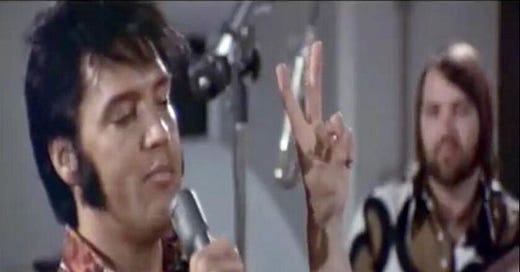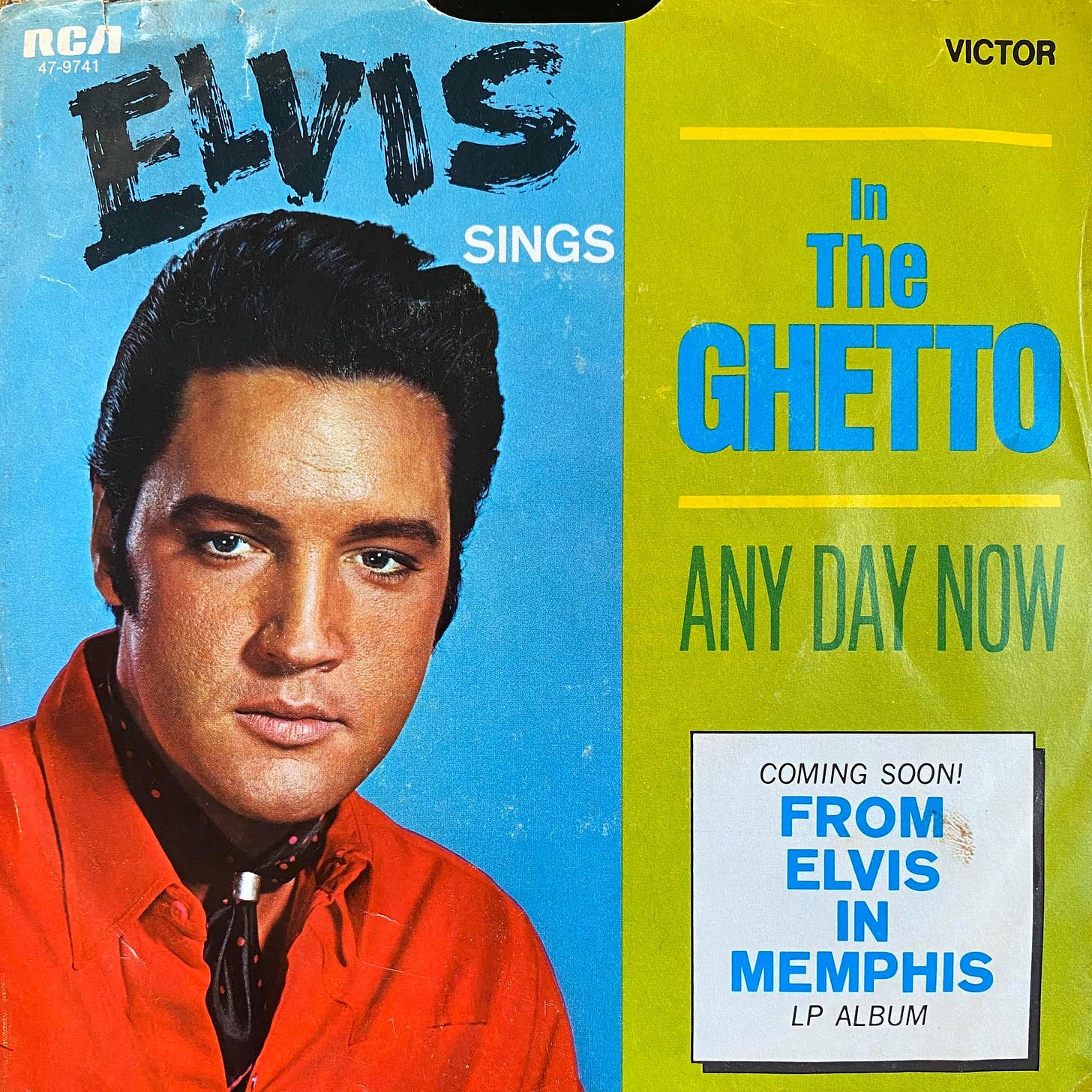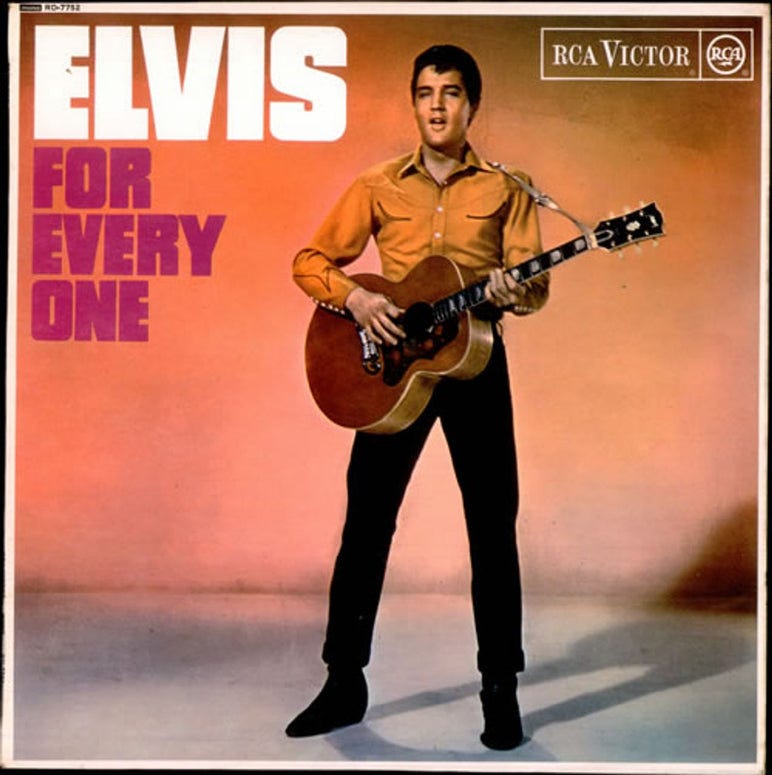Greetings, Jagged Time Lapsers!
I’m still kind of getting it into gear in this new year, as I’m sure many of you are as well. So in honor of the 90th anniversary of Elvis Presley’s birthday tomorrow (January 8), I’ve decided to re-run this JTL post from two years ago — it’s a favorite of mine, and since a large portion of my subscribers had yet to board the JTL (mystery) train at the time I originally wrote it, this’ll likely be new material for most of you. And if you HAVE read this one before, there’s a new little bonus at the end… Enjoy, and I’ll see ya back here on Friday or Saturday!
I deeply love Elvis Presley’s music, and make no apologies for it. Even his more fallow artistic periods (like the the post-Army “movie years” and the final mid-seventies decline), he still managed to produce some absolutely transcendent work — you just have to dig a little deeper to find it than you do with his Sun or “comeback era” sides.
Likewise, I make no apologies for loving the absurdly cartoonish and excessive aspects of The King’s life and legend. Do I wish I could have been a fly on the wall at Sun Records for the epochal July 5, 1954 recording session that produced “That’s All Right”? Yes. Do I wish I could have been a fly on the wall at Graceland on the night of February 1, 1976, when Elvis got so amped up while telling some visiting law enforcement agents about the Colorado Mine Company’s Fool’s Gold Loaf sandwich — an 8,000-calorie cholesterol bomb involving a pound of fried bacon and jar each of grape jelly and creamy peanut butter jammed together into a hollowed-out baguette — that he impulsively decided right then to order 22 of them (at $49.95 a loaf, or over $275 in today’s US currency) and fly himself and his posse to Denver on the Lisa Marie so that they could pick them up and eat them on the runway? Also yes.
Elvis’s music and legend has cast such an extensive shadow over rock n’ roll, it would be easy for me to say that I can’t remember a time when I wasn’t aware of him, but that would be a lie. Because I can actually quite vividly recall my introduction to his existence, which happened in the early seventies when I was about five or six and Dixie Riddle Cups were all the rage among youngsters like myself. I usually “got” the riddles that were printed on them, but the cup I pulled on this particular day just left me confused.
Q: What’s green and sings?
A: Elvis Parsley.
I misread the answer as “Elves Parsley,” which made even less sense to me than if I’d read it correctly. “Mom,” I cried out, agitatedly waving the cup in her face. “What’s Elves Parsley?” “Oh, it’s a joke on Elvis Presley,” she explained.
“Who’s Elvis Presley?” I asked.
“He’s a popular singer.”
Her explanation didn’t exactly send me running off in search of his records; I would remember his name from then on, but mostly just because it sounded weird to me. My first encounter with his music and image wouldn’t come until a year or so later, when this commercial was suddenly all over the TV on weekday afternoons…
Watching it now, I’m blown away by two things: 1) How absolutely shoddy the spot is, with just a small grab-bag of still images providing the “visuals,” and 2) How deeply those exact same images are burned into my brain in association with the songs. Fr’instance, whenever I hear “Jailhouse Rock,” I immediately think not of the epic dance sequence from the 1957 film of the same name, but of Elvis wearing what I now know as his “Comeback Special” leathers. Why? Because that’s the image the commercial uses under the brief burst of that song. And the same goes for numerous other classic Elvis tracks featured in the TV spot; hell, it has been years since I’ve seen this ad, and yet I can still fairly accurately anticipate which image is coming next.
So yeah, this commercial made a huge impression on me. And I loved enough of the song-snippets I heard in it to consider myself an Elvis fan, despite his weird name and despite the fact that it would be many more years before I bought any of his records, or in many cases even heard the full recordings of the songs. (In first grade, I was so excited by the opening lines of “Hard Headed Woman” that I used to run around the school playground singing them over and over again. I was far less excited a half-decade or so later, when I finally heard the whole thing for the first time and realized that the song’s most prominent instrument was a trombone.)
Not long after I first began seeing that TV ad, a big dinner was held at our house in Ann Arbor that included my mom, her then-boyfriend and a bunch of their hippie friends, one of whom had invited a young woman that no one else at the health food-laden table knew. (In retrospect, I’m guessing that they had just started seeing each other.) Everyone was asking the “new girl” things about herself and her life, and everything seemed to be going swimmingly until she cheerfully volunteered that she was “wild about Elvis”. At that moment, a heavy cloud of hippie judgement descended wordlessly upon the room; I instantly recognized it as the same silent ’tude my mom’s friends would invariably cop whenever I prattled on about my G.I. Joe dolls or my army of toy soldiers.
Just why the mood in the room had suddenly soured at the mere mention of Elvis was something I couldn’t figure out. I knew damn well that my mom’s friends — and my mom, for that matter — disapproved of my war games because they were staunchly against what was currently happening in Vietnam. (I mean, I was too; it wasn’t like I was sending my G.I. Joes into rice paddies to take on the Vietcong. But such distinctions were often lost amid the frought rhetoric of the time.) But Elvis? What had he done that was so bad?
I didn’t understand at the time that early-seventies Ann Arbor, the very epicenter of Midwestern hipness, was a world where Elvis was considered stodgy, “establishment” and totally out of date. If this young woman had said that she was wild about Janis Joplin or CSNY, or local heroes like The MC5 or Commander Cody and the Lost Planet Airmen, her hipness ticket would have been duly punched. But sorry, sister — the Revolution™ will not be Elvis-ized.
I don’t remember much else about that dinner; I probably excused myself from the table pretty quickly so I could get back to re-enacting the Normandy Beach landing with my army men. But I do recall feeling really badly for the “new girl”; I wanted to come to her defense and tell the room “I like Elvis, too!” but instinctively knew that support from a seven year-old warmonger like myself wouldn’t have helped her case much with that particular jury. I never saw her at our house again.
In retrospect, this incident must have been my first encounter with music snobbery. Back in those early elementary school days, my friends and I judged each other by a wide variety of exacting criteria (how funny you were, how many swear words you knew, how far you could throw a rock, etc.), but taste in music didn’t factor into it at all. That would change as we got older and began seeing the music we liked as an extension of our identities — and, for many of us, a badge of hipness.
I have been on both ends of music snobbery countless times, and it’s admittedly only been in recent years that I’ve fully come around to the notion that people should be allowed to like whatever music resonates with them and makes them feel good. But that’s a lesson I really should have learned five decades ago, when I witnessed brown rice turning to ashes in people’s mouths just because someone made the egregious faux pas of mentioning Elvis Presley.
In retrospect, that was kind of a harsh note to end this piece on — so let’s go out on something happier, like Elvis’s 1969 cover of Neil Diamond’s “And the Grass Won’t Pay No Mind”. Neil’s another artist who was considered woefully unhip by those around me during my youth; it took me until I was in college (when I discovered his early Bang! sides) to see past the schmaltz and realize how brilliant he actually was.
Of the two Neil Diamond songs he recorded, Elvis’s live 1970 recording of “Sweet Caroline” is the far better known — but I actually prefer his 1969 studio recording of “And the Grass Won’t Pay No Mind”. Much as I love Neil’s original version (from 1969’s Brother Love’s Travelling Salvation Show) and even Mark Lindsay’s 1970 cover rendition, leave it to Elvis to take one of Neil’s greatest love songs to a whole new level. That moment in the bridge where Elvis audibly shifts from gentle romantic reverie to blood-rushing passion — “Child! Touch my soul with your cries/And the music will know what we’ve found” — still gives me goosebumps every time. I sadly never got the chance to interview Neil Diamond; but if I had, Elvis’s cover of “Grass” would have been in my top list of things to ask him about…







You've inspired me to listen to him this morning! I was never much of an Elvis listener. I think that came from being a kid/young adult throughout the '80s and into the early '90s. To quote Mojo Nixon, "Elvis was everywhere." His retro value in the '80s was sky-high to the point of seeing daily commercials of 900-numbers where a caller could "talk to the king," because THE KING WASN'T DEAD. As the '90s rolled into the early '2000s, an umpteenth rockabilly revival wave was happening. Yet again, there were Elvis clones everywhere. It wasn't until recent years when I could finally go back and listen to him without of all my previous judgement clouds. Maybe there's hope for me becoming an Elvis guy!
I still talk about those Dixie riddle cups. Saw a documentary recently about the Elvis 1968 comeback special. Forget what streaming channel it was. Very well done.